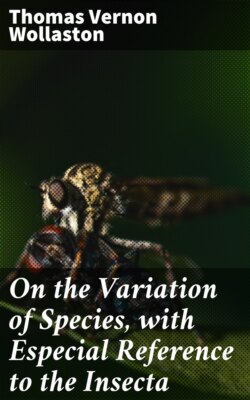Читать книгу On the Variation of Species, with Especial Reference to the Insecta - Thomas Vernon Wollaston - Страница 8
На сайте Литреса книга снята с продажи.
CHAPTER III.
CAUSES OF VARIATION.
ОглавлениеTable of Contents
"It is not impossible," says a writer of the last century, "that such laws of Nature, and such a series of causes and effects, may have been originally designed, that not only general provisions may have been made for the several species of beings, but that even particular cases (at least many of them) may have been provided for without innovations in the course of Nature[3]." And let us not suppose that this is a mere, wanton speculation, unsupported by evidence (if not actually circumstantial, at least) strongly presumptive; since the further we penetrate into the ramifications of the organic world, the less are we inclined to ignore the operation of those various modifying influences which our understanding tells us do everywhere exist.
To investigate the causes of things, and to endeavour to trace out by slow, inductive processes those secondary agents, by the assistance of which a large proportion of the phænomena around us are gradually matured, is no insignificant task; yet how much animadversion from without have the students in such fields of research frequently to endure! A fact many times repeated, and which comes within our daily experience, is too often looked upon as a matter of course, and as therefore beneath the notice of an intelligent mind; yet the man who regards truth as valuable, for its own sake, under whatever aspect it may come, and who can rise to the appreciation of results, whether they be of rare or constant occurrence, will have learnt to pronounce nothing as unimportant which may supply a single link in that chain of knowledge which would be broken and imperfect without it. A spirit of inquiry, however, is becoming, year by year, more evident; and we may confidently anticipate the period when such reproaches will have for ever died away. Natural history, in all its branches, will then advance more rapidly than heretofore, and each separate labourer, in his own peculiar province, will breathe a more genial atmosphere; whilst observation and reason, mutually dependent on each other, will work in concert more effectually. "Reason without observation," writes the author above quoted, "wants matter to act upon; and observations are neither to be justly made by ourselves, nor to be rightly chosen out of those collected by others, without the assistance of reason. Both together may support opinion and practice, in the absence of knowledge and certainty."
In the last chapter we offered a few passing remarks on insect-aberration generally, whether regarded as a universal fact (which, however, even supposing such to be true, it is not the object of the present treatise to substantiate), or as an occasional one,—that is to say, as existing at all times to that extent (as an hereditary principle), that it is liable to manifest itself, or not, according as external agencies may favour or oppose its occurrence. In the latter case, which alone I propose to consider, this inherent tendency may be displayed, either through the expression of "varieties" well defined, or by a mere proneness to wander, irregularly and at large, from an assumed diagnostic type. In the following pages, the former of these resultant conditions (namely, that in which "varieties," technically so called, though more or less isolated in their character, are apparent) will be especially discussed; since my principal desire is, to point out the influence of local disturbing causes in regulating, to a greater or less extent, though of course within certain specific limits, the outward contour of the insect tribes,—and it requires no argument to prove that, where those local elements (whatsoever they may be) prevail, the same effects will, for the most part (in the same species), be produced; and that, therefore, modifications which are characteristic of countries and regions far removed from each other have an à priori claim for stability, above those which circumstances less important than geographical ones, and which are consequently more fluctuating in their combinations, may from time to time (as it were, accidentally) shape out. Having then examined our premises, and prepared ourselves, with an unbiassed mind, for the reception of phænomena which should be constant (and in some instances, also, conspicuous) in proportion as the conditions which unite in bringing them about are significant; let us advert to a few of the more prominent cases in which our instinct would seem to warrant the belief that aberrations are to be usually anticipated. And since it will hardly be denied that, like the representatives of other departments of the animate world, insects may, in their outward configuration and development, be in some measure under the control of the external influences to which they are immediately exposed, we will take a rapid glance at a few of the circumstances and conditions which are known to have more or less of a qualifying effect on the members of large and opposite sections of the organic creation; and then see how far we are enabled, by means of facts, to trace out results for the Insecta, corresponding to those which are admitted to obtain in the other groups. And, since the existence of analogous results infers, to a certain extent, the similarity of the agents which have brought them about, our "causes of variation" (provided the effects can be shown) may be in reality almost demonstrated.
Amongst the numerous influences and conditions, in obedience to which the members of a large proportion of the animate world would appear, at times, in their outward aspect to be modified or fashioned, the following may be selected as perhaps of primary importance:—
1. Climatal causes generally (whether dependent on latitude or upon altitude).
2. Temporary heat or cold, of an unusual degree.
3. Nature of the country and of the soil.
4. Isolation, and exposure to a stormy atmosphere.
